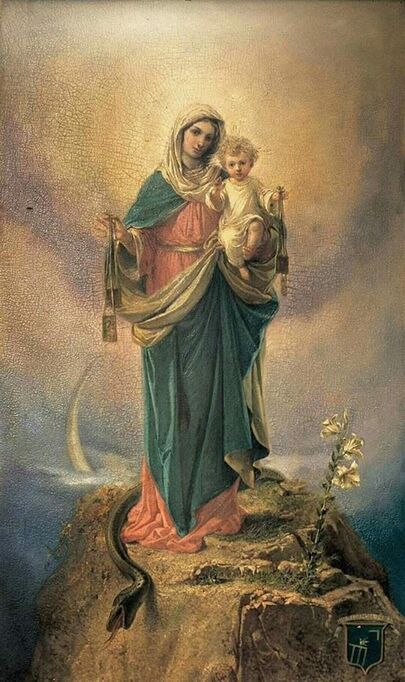|
On the Immaculate Conception
Mary is the "Virgo Veneranda," The All-Worshipful Virgin WE use the word "Venerable" generally of what is old. That is because only what is old has commonly those qualities which excite reverence or veneration. It is a great history, a great character, a maturity of virtue, goodness, experience, that excite our reverence, and these commonly cannot belong to the young. But this is not true when we are considering Saints. A short life with them is a long one. Thus Holy Scripture says, "Venerable age is not that of long time, nor counted by the number of years, but it is the understanding of a man that is grey hairs, and a spotless life is old age. The just man, if he be cut short by death, shall be at rest; being made perfect in a short time, he fulfilled a long time." [Wisdom v.] Nay, there is a heathen writer, who knew nothing of Saints, who lays it down that even to children, to all children, a great reverence should be paid, and that on the ground of their being as yet innocent. And this is a feeling very widely felt and expressed in all countries; so much so that the sight of those who have not sinned (that is, who are not yet old enough to have fallen into mortal sin) has, on the very score of that innocent, smiling youthfulness, often disturbed and turned the plunderer or the assassin in the midst of his guilty doings, filled him with a sudden fear, and brought him, if not to repentance, at least to change of purpose. And, to pass from the thought of the lowest to the Highest, what shall we say of the Eternal God (if we may safely speak of Him at all) but that He, because He is eternal, is ever young, without a beginning, and therefore without change, and, in the fulness and perfection of His incomprehensible attributes, now just what He was a million years ago? He is truly called in Scripture the "Ancient of Days," and is therefore infinitely venerable; yet He needs not old age to make him venerable; He has really nothing of those human attendants on venerableness which the sacred writers are obliged figuratively to ascribe to Him, in order to make us feel that profound abasement and reverential awe which we ought to entertain at the thought of Him. And so of the great Mother of God, as far as a creature can be like the Creator; her ineffable purity and utter freedom from any shadow of sin, her Immaculate Conception, her ever-virginity—these her prerogatives (in spite of her extreme youth at the time when Gabriel came to her) are such as to lead us to exclaim in the prophetic words of Scripture both with awe and with exultation, "Thou art the glory of Jerusalem and the joy of Israel; thou art the honour of our people; therefore hath the hand of the Lord strengthened thee, and therefore art thou blessed forever."
Comments
|
Archives
April 2024
|

